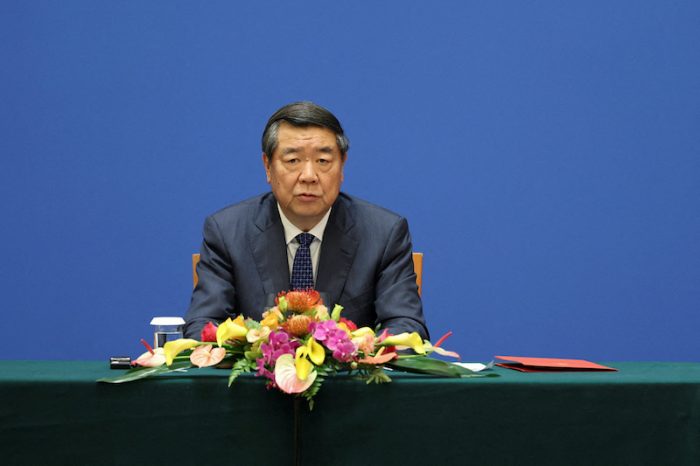Chinese markets – and many in Asia – fell on Monday after US President Donald Trump moved to curb Chinese investments in strategic areas.
The Hang Seng Index in Hong Kong dropped by 0.6% and the Shanghai Composite was down 0.2% at the end of trading on Monday.
Trump signed a memorandum on Friday, hours after Treasury Secretary Scott Bessent spoke with China’s Vice Premier He Lifeng, which directs the Committee on Foreign Investment in the United States (CFIUS) to restrict Chinese investments in critical sectors.
ALSO SEE: Xi Meet Prompts China Tech Stock Mood Change
The national security memorandum aims to promote foreign investment while protecting US national security interests from threats posed by foreign adversaries like China, a White House official said.
The “American First Investment Policy” memorandum states that the US will “use all necessary legal instruments”, including the CFIUS, to block China-affiliated investments in American “technology, critical infrastructure, healthcare, agriculture, energy, raw materials, or other strategic sectors.”
The order says that China is “exploiting our capital and ingenuity to fund and modernize their military, intelligence, and security operations, posing direct threats to United States security,” the official said.
Under the directive, the US will establish new rules “to curb the exploitation of its capital, technology, and knowledge by foreign adversaries such as China to ensure that only those investments that serve American interests are allowed,” the official said.
The Trump administration will consider new or expanded restrictions on US outbound investment to China in sensitive technologies, including computer chips, artificial intelligence, quantum, biotechnology, aerospace and more.
Beijing unimpressed
China voiced its displeasure at the news in a statement issued on Saturday by its Commerce Ministry, which said the United States should stop “politicizing” and “weaponizing” economic issues. It vowed to closely monitor the situation and take necessary measures to defend its legitimate rights and interests.
The steps threaten to heighten economic tensions with China after the president increased tariffs on Chinese imports as one of his first moves in office.
CFIUS, which scrutinizes foreign investment in the US for national security risks, has already overseen a sharp decrease in Chinese investment in the United States.
According to the Rhodium Group, annual Chinese investment has dropped from $46 billion in 2016 to less than $5 billion in 2022.
The order noted that foreign entities and individuals hold roughly 43 million acres of US agricultural land, which is nearly 2% of all land in the United States, the official said.
China owns more than 350,000 acres of farmland across 27 states, the official said.
Farm groups and lawmakers have expressed concerns in recent years that land purchases by investors and foreign countries are driving up farmland prices and threatening national security.
The White House official also noted that Chinese hackers have repeatedly targeted US entities, including recently breaching the Treasury Department’s CFIUS office, the entity responsible for reviewing foreign investments for national security risks.
The outbound regime could expand on an executive order, unveiled in 2023 by the Biden administration, to start prohibiting some US investments in certain sensitive technologies in China, and requiring government notification of other investments.
The memorandum also suggests reviewing whether to suspend or terminate the 1984 US-China Income Tax Convention in a bid to reduce incentives for Americans to invest in foreign adversaries.
Under the 1984 agreement, if a person or business pays taxes in one country, their home country can give them credit for such payments to avoid double taxation.
- Jim Pollard with Reuters
ALSO SEE:
Alibaba Shares Jump 14% as China Tech Stocks Hit a Hot Streak
Investors Pour Money Into China Tech Stocks Amid DeepSeek Fever
More Concern on DeepSeek’s Data Policies After ByteDance Link
China Tightens Focus on Tech Innovation, ‘New Productive Forces’
China Needs Tech Self-Reliance to Avoid Being Strangled: Xi
Baidu to Offer Ernie Chatbot For Free Amid DeepSeek Challenge
Apple Taps Alibaba to Bring AI to Chinese iPhones
US Rules to Limit Investment in China’s Chips, Quantum and AI
US Ban on Investment Not Good For AI Sector, China Says
US Panel Wants Investment Ban on Critical Tech Sectors in China
China’s Bid to ‘Cheat’ a Way to Chip Prominence is Failing: Envoy
US Plans New Rules for Cloud Firms to Cut Off China AI Access
























